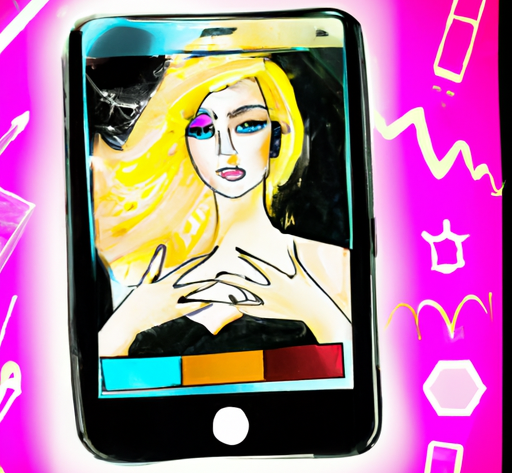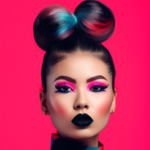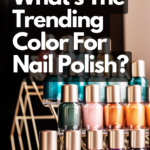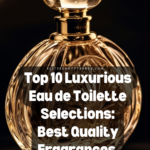Exactly how is technology influencing beauty trends? Technology has permeated every aspect of our lives, transforming the way we communicate, work, and play. But did you know that it’s also reshaping the world of beauty? From virtual makeovers to personalized skincare routines, technology has become an indispensable tool in our quest for beauty and self-expression. In this article, we’ll explore how technology is revolutionizing beauty trends, unlocking new possibilities, and empowering individuals to redefine their definition of beauty. So, get ready to discover the fascinating ways in which technology is shaping the beauty industry like never before.
The Rise of Digital Influencers
In today’s digital age, technology has transformed the way we consume beauty content and discover new trends. One significant aspect of this transformation is the rise of digital influencers. These social media personalities have gained massive followings on platforms like YouTube, Instagram, and TikTok, and have become powerful voices in the beauty industry. By sharing their expertise, tutorials, and product recommendations, digital influencers have revolutionized the way we approach beauty.
The Power of Social Media
Social media platforms have played a pivotal role in catapulting digital influencers to stardom. These platforms offer a unique space for influencers to connect with their audience and showcase their talents. Through engaging content creation, influencers can amass a loyal following and establish themselves as trusted sources of beauty advice. Social media acts as a powerful tool in amplifying their message and reaching millions of people worldwide.
The Impact of Beauty Vloggers
Beauty vloggers, also known as beauty YouTubers, have proven to be a driving force behind the popularity of digital influencers. These content creators have gained fame by sharing makeup tutorials, product reviews, and beauty hauls. Their genuine and relatable approach to beauty has resonated with viewers, making them influential figures in shaping beauty trends, product preferences, and consumer purchasing decisions.
The Role of Influencer Collaborations
In recent years, influencer collaborations with beauty brands have become increasingly prevalent. Many companies recognize the immense influence that these digital personalities possess and seek to leverage their reach to promote their products. Influencers often work with brands to create limited-edition collections or endorse existing products, which generates buzz and drives sales. These collaborations bridge the gap between the digital influencer’s audience and the brand, creating a mutually beneficial partnership.
Virtual Makeup Try-Ons
Advancements in technology have brought about virtual makeup try-ons, which have revolutionized the way we explore and experiment with different beauty looks. This technology offers numerous advantages that enhance the overall beauty experience.
Advantages of Virtual Makeup
Virtual makeup try-ons provide a convenient and risk-free way to experiment with various makeup styles, shades, and brands. Users can virtually test different products on their own faces, eliminating the need for physical samples or making costly purchases before knowing if a product suits them. This technology saves time, money, and effort, allowing individuals to confidently make informed decisions about their makeup choices.
The Role of Augmented Reality
Augmented reality (AR) plays a crucial role in virtual makeup try-ons. By overlaying virtual makeup products onto a user’s face in real-time, AR technology creates a realistic and immersive experience. Users can see how different shades of foundation, lipstick, or eyeshadow look on their complexion without physically applying any products. This technology bridges the gap between imagination and reality, enabling users to visualize their desired looks accurately.
Snapchat Filters and Makeup Effects
Snapchat filters and makeup effects have become immensely popular in recent years. These playful features allow users to instantly transform their appearance, from applying virtual makeup to changing hair color and even applying quirky accessories. While primarily used for entertainment, Snapchat filters have also served as a source of inspiration for real-life makeup looks. Their influence on beauty trends is undeniable, as many users recreate their favorite filter-inspired looks using physical makeup products.
AI in Skincare
Artificial intelligence (AI) has made significant advancements in various industries, and the beauty industry is no exception. AI-powered skincare solutions have revolutionized the way we approach skincare routines, offering personalized recommendations and consultations.
Customized Skincare Solutions
AI-driven skincare solutions analyze individuals’ specific skin concerns, conditions, and goals to provide personalized skincare recommendations. By utilizing machine learning algorithms, these AI systems can process vast amounts of data and identify patterns, allowing for accurate and tailored advice. Customized skincare products and routines help individuals address their unique needs and achieve optimal skin health.
Virtual Dermatology Consultations
Virtual dermatology consultations have become increasingly popular, especially in remote areas or during circumstances that prevent in-person visits to dermatologists. AI technology enables individuals to upload images of their skin concerns, allowing dermatologists to remotely assess the condition and provide professional recommendations. This convenient and time-saving approach improves accessibility to skincare expertise, ensuring everyone has access to quality dermatological advice.
Smart Beauty Devices
Smart beauty devices integrated with AI have also made their mark in the skincare industry. These devices utilize AI algorithms to analyze skin conditions, measure hydration levels, and recommend suitable skincare products. From facial cleansing brushes to at-home skin analysis devices, these smart beauty devices empower individuals to take charge of their skincare routines and make informed decisions based on personalized data.
The Evolution of Beauty Apps
Mobile applications dedicated to beauty have evolved significantly over the years. These apps offer a range of features and functionalities that enhance users’ beauty experiences, from virtual hairstyling to makeup enhancement and product scanning.
Virtual Hairstyling and Hair Color Apps
Virtual hairstyling and hair color apps have become popular tools for those looking to experiment with new hairstyles or hair colors. Users can upload a photo of themselves and virtually try on various hairstyles or colors, helping them visualize the final look before committing to a change. These apps provide inspiration and guidance, enabling users to make confident decisions when visiting their hairstylist.
Makeup Apps for Enhancing Features
Makeup apps have emerged as useful tools for enhancing features and perfecting makeup looks. These apps offer various filters, effects, and editing tools that allow users to retouch their photos, smooth skin, adjust lighting, and even apply virtual makeup. While primarily used for editing photos, these apps also serve as sources of inspiration for real-life makeup looks, encouraging users to experiment with different styles and techniques.
Beauty Product Scanning Apps
Beauty product scanning apps have transformed the way we research and shop for beauty products. These apps enable users to scan product barcodes or input product names to access detailed product information, ingredients lists, and reviews. This technology promotes transparency and empowers consumers to make informed decisions based on their preferences, allergies, or ethical considerations. It also acts as a valuable tool for identifying counterfeit products, ensuring the authenticity and safety of purchases.
The Influence of AI in Sourcing Beauty Recommendations
AI-powered algorithms have become instrumental in sourcing personalized beauty recommendations by analyzing data and identifying patterns.
Machine Learning Algorithms
Machine learning algorithms analyze vast amounts of data, such as user preferences, purchasing habits, and skincare concerns, to identify patterns and make accurate predictions. By constantly learning from user interactions and feedback, these algorithms can provide highly personalized beauty recommendations that cater to individual needs, preferences, and goals. This level of personalization ensures that users receive tailored suggestions that align with their unique beauty journey.
Personalized Product Recommendations
AI-powered algorithms enable platforms to recommend beauty products based on individual preferences, skin type, and desired outcomes. These recommendations take into account factors such as ingredient compatibility, efficacy, and user reviews. By making the beauty shopping experience more personalized, AI ensures that users find products that suit their needs, leading to higher customer satisfaction and increased brand loyalty.
AI-powered Beauty Assistants
AI-powered beauty assistants have become increasingly popular tools for providing personalized beauty advice and recommendations. These virtual assistants interact with users, asking questions about their preferences, skin concerns, and beauty goals. Based on the information provided, these assistants offer tailored product recommendations, suggest suitable beauty routines, and provide valuable insights. AI-powered beauty assistants act as trusted advisors, guiding users through their beauty journeys and helping them make well-informed choices.
Social Media Beauty Challenges
Social media platforms have popularized hashtags challenges, which have become a viral phenomenon and a marketing strategy utilized by beauty brands.
The Phenomenon of Hashtag Challenges
Hashtag challenges on platforms like Instagram and TikTok have become a global phenomenon. Beauty-related challenges encourage users to participate in creative makeup looks, skincare routines, or hair transformations, all centered around a specific hashtag. These challenges not only promote creativity and engagement within the beauty community but also serve as a way for brands to generate user-generated content and fuel brand awareness.
TikTok’s Role in Setting Trends
TikTok, with its short-form videos and fast-paced content, has emerged as a powerful platform for setting beauty trends. Users on TikTok share tutorials, product reviews, and demonstrations, and their videos can quickly go viral, influencing millions of viewers worldwide. The platform’s algorithm prioritizes discovery, ensuring that new trends spread rapidly. As a result, TikTok has become an essential part of the beauty landscape, with beauty-related content consistently gaining traction and shaping the industry.
Beauty Challenges as a Marketing Strategy
Beauty challenges have proven to be an effective marketing strategy for brands. By creating challenge-specific hashtags and encouraging users to participate, brands generate valuable user-generated content and build a sense of community around their products or campaigns. These challenges foster engagement, increase brand visibility, and create buzz, ultimately driving sales and brand loyalty.
The Impact of Filtered Selfies
The prevalence of photo editing apps and filters has influenced society’s perception of beauty and contributed to debates about authenticity and self-esteem.
The Rise of Facetune and Photo Editing Apps
Facetune and other popular photo editing apps have gained significant popularity, offering users the ability to retouch their photos and enhance their appearance. These apps provide tools to adjust skin smoothness, whiten teeth, reshape features, and much more. While many users enjoy the creative freedom these apps provide, there is concern that they contribute to unrealistic beauty standards and promote a filtered version of reality.
The Pressure to Appear Perfect
Filtered selfies and edited photos create societal pressure to achieve an idealized version of beauty. With platforms like Instagram showcasing curated and seemingly flawless images, individuals may feel compelled to conform to an unrealistic standard. This pressure can lead to low self-esteem, body image issues, and a distorted perception of beauty. It is crucial to promote an authentic and inclusive representation of beauty and celebrate individuality.
The Debate Over Authenticity
The debate over authenticity in beauty imagery continues to spark conversations. While filters and editing apps offer creative expression and allow individuals to curate their online presence, there is growing demand for transparency and authenticity. Many influencers and brands are challenging traditional beauty standards by sharing unretouched photos and embracing imperfections. It is essential to recognize the impact these filtered images have on self-esteem and advocate for a healthier and more realistic beauty culture.
Inclusive Technology and Diversity
Technology plays a vital role in expanding beauty standards, promoting inclusivity, and empowering individuals of all backgrounds to express themselves authentically.
Expanding Beauty Standards
Technology has played a crucial role in challenging traditional beauty standards and promoting inclusivity. The beauty industry has made significant strides in embracing diverse representations of beauty, and technology has been a driving force behind this change. From inclusive foundation shade ranges to featuring diverse models in marketing campaigns, technology has facilitated a shift towards a more inclusive and representative beauty industry.
Digital Tools for Accessibility
Digital tools have become invaluable for individuals with disabilities, enabling them to access and engage with beauty content. Closed captions, audio descriptions, and screen readers make beauty videos and tutorials accessible to those with hearing or visual impairments. Additionally, digital tools have allowed those with physical disabilities to participate in beauty practices independently, with features such as voice-activated beauty devices or adaptive makeup tools.
The Fight against Bias in AI
As AI becomes more integrated into the beauty industry, there is a growing concern about the potential for biased algorithms. Bias in AI can perpetuate societal inequalities and exclude marginalized communities from accessing personalized beauty recommendations or representation. It is crucial for developers and industry leaders to actively address bias, ensure diverse datasets, and prioritize inclusivity to create a technology-driven beauty landscape that caters to everyone.
The Role of E-commerce Platforms
E-commerce platforms have transformed the way we shop for beauty products, offering virtual makeup shopping experiences, curated subscription boxes, and influencer partnerships.
Virtual Makeup Shopping
E-commerce platforms offer virtual makeup shopping experiences that allow users to try on products virtually before making a purchase. By utilizing augmented reality or virtual reality technology, users can see how different makeup looks and shades suit them in real-time, enhancing the online shopping experience and reducing the risks associated with purchasing products without testing them physically.
Beauty Subscription Boxes
Beauty subscription boxes have gained popularity in recent years, thanks to e-commerce platforms. These subscription services curate a selection of beauty products that are delivered to subscribers’ doorsteps regularly. The curated boxes often feature trending products, new releases, or personalized recommendations based on subscribers’ preferences. Beauty subscription boxes offer a convenient and exciting way to discover new products and stay up-to-date with beauty trends.
Social Commerce and Influencer Partnerships
Social commerce, the integration of e-commerce within social media platforms, has transformed the way consumers shop for beauty products. Many e-commerce platforms collaborate with influencers to promote their products, creating seamless shopping experiences through influencer product links or discount codes. Influencer partnerships often build trust and offer exclusive deals, providing consumers with an added sense of value and authenticity when making purchasing decisions.
Tech-Driven Skincare Innovations
Innovative technologies have revolutionized the skincare industry, offering advanced treatments and solutions that were once limited to professional settings.
LED Light Therapy
LED light therapy, a non-invasive skincare treatment, has gained popularity due to its effectiveness in treating various skin concerns. LED devices emit different wavelengths of light, which penetrate the skin to stimulate collagen production, target acne-causing bacteria, and reduce inflammation. Portable LED devices allow individuals to incorporate professional-grade treatments into their home skincare routines, promoting healthy and radiant skin.
Microcurrent Technology
Microcurrent technology has become a popular anti-aging skincare solution. This treatment involves using low-level electrical currents to stimulate facial muscles, promoting improved tone and reducing the appearance of fine lines and wrinkles. Handheld microcurrent devices allow individuals to perform these treatments at home, providing a cost-effective alternative to professional spa treatments.
Skin Analysis Devices
Skin analysis devices have revolutionized the way we understand and monitor our skin’s health. These devices use advanced technologies, such as cameras, sensors, or digital imaging, to assess skin conditions and offer personalized recommendations based on the data collected. From measuring hydration levels to identifying blemishes or sun damage, these devices empower individuals to make informed choices when selecting skincare products and routines.
In conclusion, technology’s influence on beauty trends has brought about significant advancements and changes in various areas of the beauty industry. From the rise of digital influencers to virtual makeup try-ons, AI-powered skincare solutions, and inclusive technology, the beauty landscape continues to evolve and become more accessible. As technology continues to shape and redefine beauty trends, it is important to harness its power responsibly and promote an inclusive and authentic beauty culture.




